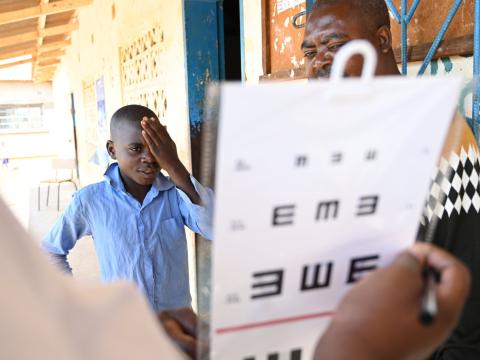World Vision supports learners with disabilities in Zambia to overcome learning hurdles

By Justine Njovu - Communications Officer, Zambia
-
Taonga, a Grade 4 student at Soyo Primary School in Lumezi District, staggers forward uncomfortably towards Dr. Phiri to get on the classroom table which has been temporally turned into a medical examination table. The doctor rushes forward to give assistance to the young girl seeing she is having difficulties walking.
Within 30 minutes, the doctor is able to diagnose that Taonga suffers from cerebral palsy with motor development anomalies, and recommends that Taonga be eligible to receive an assistive device. The news comes as a relief to Taonga and the school headteacher present at the screening process. He has seen the little girl struggle to miss out on learning countless times due to the discomfort caused by her disability whenever she walked to school.
This diagnosis will now pave a way for Taonga to receive an assistive device in order to help her overcome her mobility learning challenges caused by her disability. “I am happy that people can check me; I am just looking forward to getting the help that will see me coming to school with much ease”, she says.
For close to two weeks, school-going children suspected of having disabilities from across more than 110 schools in Lundazi and Lumezi districts in the Eastern province of Zambia, were screened for disabilities through the UPLIFT Project funded by the European Union in Zambia. The project is implemented by World Vision and the Forum for African Women Educationalists of Zambia (FAWEZA).
The purpose of the screening was to identify learners with disabilities and then provide assistive devices in order to help them overcome learning hurdles. The exercise was conducted in partnership with Zambia Agency for People with Disabilities (ZAPD), working with medical doctors from the Ministry of Health who examined learners across the two districts.
UPLIFT Project Acting Manager Chibuye Mwila said the screening exercise was necessitated by the need to support learners with disabilities to help them equitably participate in education activities. “Part of this project is to ensure that learners with disabilities are registered and issued with disability identity cards, but most importantly that they are given assistive devices to aid them in overcoming learning challenges”, he said.
Meanwhile, World Vision's Gender Equality and Social Inclusion (GESI) coordinator Doreen Chizyuka who took part in the assessment said it was important to ensure that a conducive environment was created for children with disabilities to help them feel safe and accepted. “In most communities, children with disabilities are often stigmatised or hidden in their homes by their families because of their disabilities”, she said. “Schools are safe havens for learners with disabilities because they help avert most forms of abuse that may target children with disabilities.”
Lundazi Educational Standards Officer for Special Education, Isaiah Mwalishinka, said that his office has since recommended that some learners identified during the screening exercise should be transferred to schools with special units. He is hopeful that World Vision will offer the identified learners scholarships through the UPLIFT Project. “We are grateful to the UPLIFT Project for partnering with the Government on assisting learners with disabilities in our schools”, he said.
The UPLIFT Project is a European Union-funded education project that seeks to address barriers to education access for vulnerable children and youth. The project is being implemented in 120 schools in the Lundazi and Lumezi districts of Eastern Province.